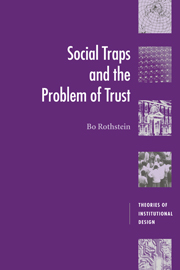Book contents
- Frontmatter
- Contents
- List of tables and figures
- Acknowledgements
- 1 Reflections after a long day in Moscow
- 2 On the rational choice of culture
- 3 On the theory and practice of social capital
- 4 Social capital in the social democratic welfare state
- 5 How is social capital produced?
- 6 The problem of institutional credibility
- 7 Trust and collective memories
- 8 The transition from mistrust to trust
- 9 The conditions of trust and the capacity for dialog
- Bibliography
- Index
3 - On the theory and practice of social capital
Published online by Cambridge University Press: 22 September 2009
- Frontmatter
- Contents
- List of tables and figures
- Acknowledgements
- 1 Reflections after a long day in Moscow
- 2 On the rational choice of culture
- 3 On the theory and practice of social capital
- 4 Social capital in the social democratic welfare state
- 5 How is social capital produced?
- 6 The problem of institutional credibility
- 7 Trust and collective memories
- 8 The transition from mistrust to trust
- 9 The conditions of trust and the capacity for dialog
- Bibliography
- Index
Summary
Few books have had an impact on the international debate on political science and policy issues equal to that of Making Democracy Work, published in 1993 by Robert D. Putnam. In the flood of books, scholarly papers, and reports from the political and social scientific field in the 1990s, Putnam's book is one of the few that can now be said to have attained the status of a modern classic. This statement does not imply that the theories, methods, and results related to the importance of social capital presented in the book are undisputed. In fact, the opposite is closer to the truth, but it is nonetheless apparent that through this work, Robert Putnam set a new agenda for much of research on politics and society. Not least, his theses have sparked a number of intriguing controversies within the research community (Durlauf 2002; Encarnación 2003; Krishna 2002; cf. Levi 1996; Portes 2000; Stolle 2000a, 2003; Tarrow 1996; Uslaner 2002). The theory has also inspired widespread public discussion and engaged the interest of many people outside the field of social scientific research.
International organizations have also noted the meaning of social capital, especially in the area of development and humanitarian aid (Krishna 2002; Woolcock and Narayan 2000).
- Type
- Chapter
- Information
- Social Traps and the Problem of Trust , pp. 43 - 70Publisher: Cambridge University PressPrint publication year: 2005

